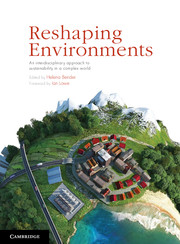Book contents
- Frontmatter
- Contents
- Contributors
- Acknowledgements
- Introduction Reshaping environments – an opportunity for envisioning the future
- Part 1 Cases
- Part 2 Skills
- 9 Critique, analysis and reflection in the study of reshaping environments
- 10 Working with complex issues in group situations
- 11 Understanding research methodology
- 12 An interdisciplinary approach
- Part 3 Theory
- Index
- Plate Section
- References
10 - Working with complex issues in group situations
from Part 2 - Skills
Published online by Cambridge University Press: 05 February 2013
- Frontmatter
- Contents
- Contributors
- Acknowledgements
- Introduction Reshaping environments – an opportunity for envisioning the future
- Part 1 Cases
- Part 2 Skills
- 9 Critique, analysis and reflection in the study of reshaping environments
- 10 Working with complex issues in group situations
- 11 Understanding research methodology
- 12 An interdisciplinary approach
- Part 3 Theory
- Index
- Plate Section
- References
Summary
We are all faced with a series of great opportunities brilliantly disguised as insoluble problems.
(Gardner 1966, cited in Shapiro 2006, p. 300)Introduction
The world of the 21st century presents many complex issues including climate change, overpopulation, global poverty and terrorism. Even at a smaller scale, there are difficult issues to resolve, such as supplying a city’s inhabitants with water, energy, food or services like transport and communications, as well as removing and processing waste in its many forms.
Consider climate change. It is complex for a variety of reasons: there are many systems that interact and that result in what humans experience as climate; there is uncertainty from a scientific point of view that affects the predictions of climate and weather risks; there is political controversy in many parts of the world about how to respond to changes in the climate; furthermore, climate change will affect nations and peoples in diverse and unequal ways. Rittel and Webber (1973) called these complex social issues ‘wicked problems’ because uncertainty is an inherent characteristic; the issue occurs in an interacting open system; there are many stakeholders who view the issue differently, each preferring a different set of boundaries and evaluation criteria; there is no one solution and no simple solutions; and whichever response is taken will have significant consequences for all stakeholders. Given that Australia is a large carbon dioxide producer if measured per head of population, but a small producer in absolute terms, there are uncertainties about how much difference any change Australians make will affect the global climate. There are also uncertainty and disagreement about the extent of Australia’s responsibilities.
Information
- Type
- Chapter
- Information
- Reshaping EnvironmentsAn Interdisciplinary Approach to Sustainability in a Complex World, pp. 227 - 241Publisher: Cambridge University PressPrint publication year: 2012
